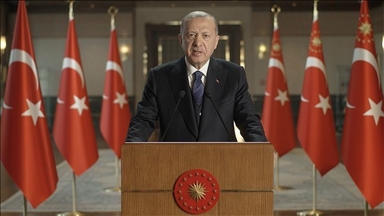“Campaigners claim Ankara is abusing its position as host, by pressuring the police body to harass dissidents living abroad” reports Kim Willsher in Guardian.
Human rights activists have accused Turkey of using its role as host of Interpol’s general assembly to push for a crackdown on critics and political opponents who have fled the country.
The alert came after the Turkish interior minister, Süleyman Soylu, said his government would use the three-day event in Istanbul to persuade the international criminal police organisation’s officials and delegates to find, arrest and extradite Turkish dissident citizens – particularly those it labels terrorists – abroad.
Campaigners have long accused authoritarian regimes of abusing Interpol’s “red notice” system used to hunt down criminals at large, including drug smugglers, people traffickers, war crime suspects and terrorists. Turkish authorities have been accused of repeatedly swamping the police organisation with requests targeting political opponents.
There have also been growing concerns about politically motivated abuse of Interpol in the US Senate where a new bill aimed at ending the organisations’ misuse to “pursue, harass or persecute political opponents and dissidents with trumped up criminal charges” was introduced in July.
There has been angry reaction to the appointment of Ahmed Nasser al-Raisi, an Emirati general accused of torture, as the new president of Interpol. Al-Raisi was elected to the position on Thursday despite the alarm being raised over his candidacy by foreign leaders. The UAE has also been accused of abusing the red notice system to pursue dissidents.
The Turkish president, Recep Tayyip Erdoğan, told the opening session of the 89th Interpol general assembly on Tuesday that he expected “strong cooperation” in the extradition of people suspected of following the US-based Islamic preacher Fethullah Gülen and the PKK, the Kurdish movement.
On Wednesday, Interpol secretary general Jürgen Stock told journalists the organisation would not act on requests motivated by anything other than policing issues.
“If member countries decide to use Interpol they have to apply to our rules and standards. If a red notice has a predominantly political background we don’t take any action. If it’s political we’re out … we respect and protect human rights,” Stock said.
Interpol has rejected almost 800 red notice requests from Turkey in the past five years, an Interpol spokesperson told the Guardian, insisting that each request was rigorously checked. But critics from the Turkish Democracy Project claim some exiles have been unjustly threatened with arrest and extradition by the organisation.
“We are a policing organisation not a political one but we’re not blind to issues of geopolitics,” Interpol said.
“The committee carefully checks applications from countries where we know there might be a problem. We have a taskforce that reviews every single red notice request from every member country to make sure its compliant. We put a lot of resources and effort into making sure the red notice system is respected.”
In August, the Stockholm Center for Freedom, a non-profit advocacy organisation promoting the rule of law, democracy and human rights and focusing on Turkey, accused the Erdoğan regime of having “weaponised” Interpol for its wider campaign of repression against critics, human rights activists and ethnic or religious minorities abroad.
It added: “Turkey abuses Interpol in various ways. The International Notice System, such as red notices and diffusions, are used to target political opponents who have committed no crime other than being critical of President Erdoğan’s government.
“Turkey is also accused of manipulating Interpol’s Stolen and Lost Travel Documentsdatabase (SLTD) by filing tens of thousands of cases for critics and opponents who, in many instances, are not even aware that their passports have been invalidated.”
Campaigners are also concerned about Syria’s recent readmission to Interpol after it was banned for human rights abuses and war crimes fearing the Damascus regime will attempt to sabotage legitimate asylum claims abroad. Russia, China and Iran have also been accused of misusing Interpol’s red notices.
Interpol was set up in 1923 mainly to ensure criminals could not with impunity flee the country where their crime was committed. The organisation enables law enforcement agencies from its 194 member states to share data on crimes and criminals and issue arrest warrants.
Madeleine Joelson, executive director of the Turkish Democracy Project, said: “Interpol – once a bastion of law and order – has become a tool of transnational repression. Erdoğan, along with Vladimir Putin and Xi Jinping, continues to abuse and degrade the liberal international order – distorting its true purpose and undermining its credibility.”
Guardian, November 25, 2021, Kim Willsher

